Anytime, anywhere in the world, when one person looks at another, whether deliberate or not, thoughts and feelings cross their mind.
That initial first impression is full of incorrect assumptions.
There are reasons for this, and these reasons are what we need to be aware of. As human beings, we tend to be so unaware of the effects of our actions. As a woman of colour, growing up in a predominantly white part of the world, the fact that I looked different changed how I saw and thought about myself. It took me years to overcome that.
When I was younger, I was scared to tell new “friends” my name. When I had before, I’d been laughed at. I was fortunate enough not to have experienced any outright violence or racial slurs, but for a child, even the snide comments and looks in the corridor are enough to make you think there’s something inherently wrong with you.
All of that was ignorance, and I know there was no malicious intent. But that’s what makes it so bad—that this is the culture we are raising the next generation into: a culture of subconscious discrimination, a culture which allows children to look down on other children because of the colour of their skin.
This is not the culture that the generations after us should have to face. This is not the culture they deserve to face. To ensure that this is not our continuing reality, we must understand stereotyping, prejudice, and discrimination.
These three things are among the roots of racism, sexism, homophobia, and more:
Stereotyping
Stereotypes are super simplified generalizations about groups of people. They’re the things you think of when you hear someone described by their age, gender, ethnicity, sexual orientation, or race—the things you can’t help thinking because of how those groups of people are generally portrayed.
Prejudice
Prejudice is based on the beliefs and attitudes that someone has about a group. Prejudice is not based on experience, but instead is founded in our prejudgments of others—like a presumption.
Discrimination
Discrimination is acting based upon our stereotypes and prejudices, whether a violent act like police brutality, or not giving someone a job because of the colour of their skin or the sound of their name. When we treat people differently because of one of the groups they fit into, discrimination is afoot.
And there are psychological reasons behind stereotyping, prejudice, and discrimination. They can be explained by a theory called the Social Identity Theory.
Social Identity Theory
The in-group is the group we’re part of, and the out-group is the “other” group. We all have these groups. I know that, for me, my associated in-groups are defined by my ethnicity, my hometown, my interests, the list goes on. You could probably list your own.
There are three stages in the mental process by which we come to identify with our demographic, or our own personal niche, and thus create “others.”
Social categorisation
We put ourselves and others into groups based on characteristics. We do this to understand our social environment and feel more comfortable in it. We do this subconsciously to make ourselves feel more in control.
Social identification
We adopt the identity of the group we have put ourselves in. This gives us an emotional connection to our chosen group. When we meet or see other people from the same group as us, we feel a sense of pride and community. This means the self-esteem of one person is affected by the reputation and defining characteristics of their in-group.
Social comparison
Once we have categorized ourselves as part of a group, we tend to compare that group with other groups. Once two groups decide they’re rivals, each group has to compete for the members in it to feel good about themselves. This comparison between groups causes us to exaggerate the differences between groups and exaggerate the similarities of members in the same group. So we stereotype and discriminate against each other.
But that’s all theory. What about the real world?
Our sense of social identity is one of the biggest causes of conflict in the world today. We can overcome this incredibly strong sense of social identity with our personal identity.
Our personal identity is the combination of ideas we have about ourselves over the course of our life. Some aspects, of course, we cannot control, but our choices and beliefs are largely what make us the people we are.
Conflict occurs because we put our in-group characteristics above who we are as individuals. But that’s what we need to remember—that above all, we all are people. That should come above anything and everything else.
This simple shift in thought—switching from groupthink to individualism—could solve so many problems on every scale, from global conflict over race and religion, to the generations after us simply growing up more accepting of themselves and others.







Read 0 comments and reply